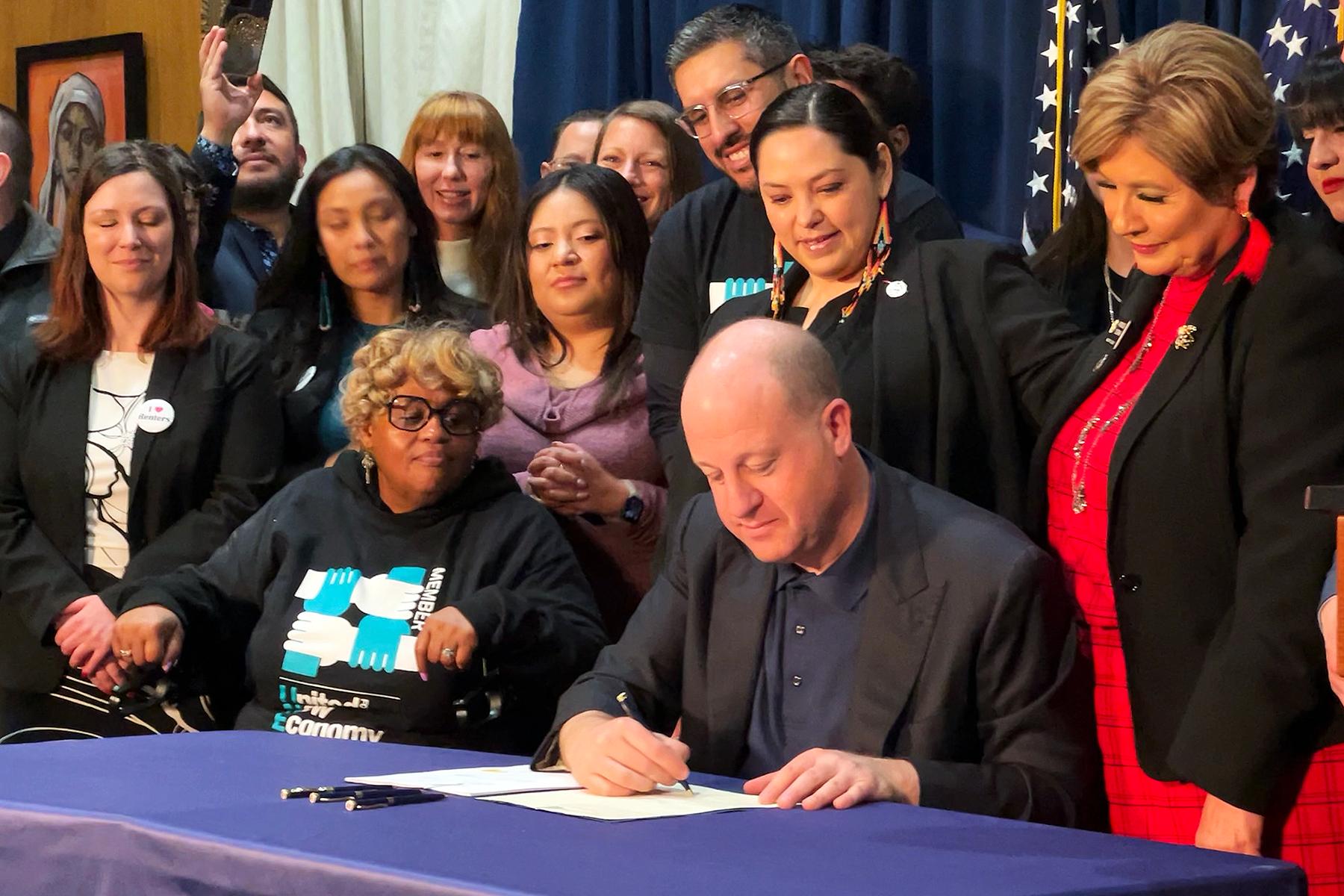
A new law set to take effect immediately will require landlords to offer lease renewals unless they can provide a specific reason to refuse. It upends existing law that gives landlords freedom to decide whether or not to offer a lease renewal.
Gov. Jared Polis signed a revised version of the bill Friday. It was a sign that progressives and moderates have bridged some of their divides in how to approach the state’s lack of affordable housing since a similar proposal on eviction protections failed in the Colorado Senate last year.
“It’s going to make a huge difference. What this law says is your landlord, if they're continuing in the business of being a landlord, and you are following the rules, they cannot remove you.
“What that means is we're recognizing that those who cannot afford to own homes deserve stability, too. And if you're being removed, there's got to be a reason for it,” said Rep. Javier Mabrey, a Democratic sponsor of both versions of the bill.
Polis congratulated the sponsors but said little about the new law as he signed it. At the ceremony, dozens of housing and community advocates crowded around and cheered as the governor put pen to paper.
The new law spells out reasons landlords will be able to decline to renew, such as if the property is going to be sold, substantially repaired, or renovated, or if the landlord’s family plans to move in.
Landlords may also evict tenants if they want to convert the unit into a short-term rental. That provision was added to win over support after last year’s failure. It’s one way in which this year’s law is significantly narrower than a more expansive "just cause" bill that was proposed last year.
However, the newly signed version has still drawn sharp pushback from landlords, Republicans, and others, who say it will discourage would-be landlords from renting out their properties and especially affect smaller real-estate businesses.
“We just need to tap the brakes and see what has already happened to the Colorado rental market before we move forward with additional legislation that could really exacerbate our housing crisis,” said Angela McCoy, who testified in committee that she and other small landlords were opting out of the market amid rising regulation.
What it says about the politics of housing
Democrats are taking the bill’s passage as a positive sign about the rest of their housing bills.
The party’s lawmakers are split into two major camps on housing: Some, like Mabrey and Sen. Julie Gonzales, are focused first and foremost on guaranteeing new protections for renters and building designated affordable housing. Others, like Polis, are most interested in loosening development rules to spur new construction of housing of all types.
In 2023, those priorities collided. When the Senate didn’t pass the original “just cause” bill for renters, it weakened progressive support for the governor’s landmark land-use proposal, which also failed in the Senate.
This time, the narrower “for cause” proposal has been finalized and signed by the governor with several weeks to go before the end of the session.
Gonzales and Mabrey said since last year’s failure, they worked many hours to shore up support, including when Mabrey took House Speaker Julie McCluskie to observe proceedings at evictions court.
Those efforts helped to win over Majority Leader Rep. Monica Duran as a cosponsor of the measure. Duran said she was once left homeless when a landlord refused to continue renting to her and her son as they were fleeing domestic abuse.
“People felt like we failed in delivering to voters real change in housing, and this year, we're stepping up and changing that,” Mabrey said.
Meanwhile, a package of land-use bills backed by Polis is advancing to the Senate. Mabrey said that Democrats are determined not to repeat last year’s housing policy bust.
Still, Gonzales warned that time is running out, with the legislative session set to end May 8.
“I think what that means is a lot of late nights and a lot of intense conversations in the last remaining days of the legislative session,” she said.
How evictions will work under the new law
At the end of a lease, the landlord will generally have to offer a “new rental agreement with reasonable terms,” according to the legislation.
Landlords will have to give 90-day notice if they instead plan to demolish the residence, convert it to a nonresidential use, or turn it into a short-term rental property. In those cases, the landlord can initiate a “no-fault eviction.”
Landlords also can force out tenants if they plan to make substantial repairs, renovations, to sell the home, or if the landlord or a family member wants to move into the home. If a landlord fails to follow the law, the tenant can use that as a defense against eviction proceedings.
Tenants can still be evicted for a variety of the usual reasons, such as nonpayment of rent or violation of the lease. Tenants can also be tossed for interfering “with the quiet enjoyment of the landlord or other tenants.”
But landlords and others have criticized the measure, saying it’s an unjust infringement of landlords’ property rights.
“This is America, folks. We don’t do that here,” said Sen. Barbara Kirkmeyer, a Weld County Republican, in an earlier debate.









